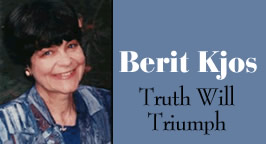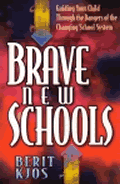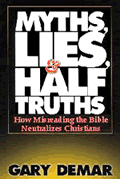Other Kjos Articles:
Harry Potter and The Postmodern Church
Popular Occultism and the Consensus Process
Legalized Mind Control Part 1Harry Potter And The Chamber of Secrets
Part 1
Hegelian Alchemy And
Mind Changing Games
Part 2
Pagan Fantasies Join The Digital Explosion
Part 3
The Global Message Behind Mystical
Thrills
TRAINING STUDENTS TO RETHINK THE BIBLE
By Berit Kjos
September 16, 2005
NewsWithViews.com
"Do you think Adam and Eve received a fair deal as described in Genesis?... Eve did not know good from evil, how could God blame them for disobeying?"[1] The Bible and Its Influence
"From the Book of Daniel, then, come images that are associated with the so-called 'end times'.... Try your hand at doing some apocalyptic writing."[2] The Bible and Its Influence
Virtually banned from American schools in the early sixties, the Bible has faced a rising onslaught of wrath, ridicule, and legal assaults. Its most vocal antagonists include People for the American Way (PAW) and the American Civil Liberties Union (ACLU). So why would these and other public opponents suddenly turn and applaud a textbook titled, "The Bible and Its Influence"? Why such enthusiastic support for a revolutionary curriculum published by the Bible Literacy Project?
The answer may lie in the word revolutionary. This new curriculum fits into a set of social and political changes likely to affect every American family. Joseph Farah summarized it well in his exposure (9-3-01), of a "political movement" embraced by key leaders in the Bible Literacy Project.
Communitarianism, wrote Farah, "places the importance of society ahead of the unfettered rights of the individual.... Here's what you will find under 'communitarian' if you use Webster's New World.... 'a member or advocate of a communistic or communalistic community.'... Both center on the idea that the individual needs to be de-emphasized in favor of the 'community' or the 'state.'"
"I still believe in old-fashioned freedom," Farah concluded, "...in the inalienable rights of the individual and the limited powers of the state. These are concepts at odds with communitarianism."[3]
General Ben Partin shares that concern. In a recent conversation (11-2-05), he recalled that, �The 1928 Program of the Third International calls for disarming the citizenry as a final step in the 'preparatory phase' of a Communist 'War of National Liberation.'" Not surprisingly, the 1991 "Communitarian Platform" calls for "domestic disarmament."... What is the difference between "disarming the citizenry" and "domestic disarmament?"
Amitai Etzioni, founder of the Communitarian Network, is a member of Mikhail Gorbachev's World Political Forum. The Forum website introduces Etzioni as "Professor of Sociology at Columbia University for 20 years." In 1980, he "was named the first University Professor at The George Washington University, where he was the Director of the Institute for Communitarian Policy Studies..... He was the editor of 'The Responsive Community: Rights and Responsibilities,' the organization�s quarterly journal" until 2004.[4]
In his book, "A Third Way to a Good Society," Etzioni described three parts of the rising Communitarian framework:
1. SYSTEMS: "The good society is a partnership of three sectors: government, private sector, and community." [This sounds like Peter Drucker! Remember, in any partnership between these three sectors, the control will flow with the funding from the top down to the community, since the standards are established at the highest level.]
2. STANDARDS and ASSESSMENTS: "A balanced society approaches the tension between individual rights and social responsibilities along these lines and adjusts its policies accordingly." [This continual policy "adjustment" requires frequent surveys and assessments.] "To ensure that this core education principle will be heeded, an annual assessment should be made in all schools..." [The standards for "human resource development" include changed attitudes, collective values, and social participation. The latter is assessed by the UN in communities around the world as "social capital.']
3. PROCESS: "This occurs through a process of special importance to those seeking a good society: moral dialogue.... Moral dialogues lead them to re-examine their beliefs, worldviews and prejudices and to recast them."[5] [The new "Bible" textbook with its unbiblical suggestions, questions and group session illustrates this process.]
Etzioni's Communitarian agenda fits Gorbachev's modernized Communism well. Dialogue (the dialectic process embraced by Marx and Lenin) is essential to his quest.[6]
Like Etzioni, Federico Mayor Zaragoza, former Director General of UNESCO, is a member of Gorbachev's Forum. Both men spoke at The World Political Forum General Assembly 2005 conference in March 2005. I remember Federico Mayor' message on "Solidarity" at the 1996 UN Conference on Human Settlements in Istanbul, for I taped his words:
�Citizenship for the next century is learning to live together. The 21st Century city will be a city of social solidarity.... We have to redefine the words... [and write a new] social contract.�
That social contract will require a new way of thinking everywhere. Well aware of that fact back in 1945, UNESCO's first Director-General, Julian Huxley had little tolerance for Biblical absolutes. A Fabian Socialist like his brother Aldous, he wrote:
"We must [shun] dogma - whether it be theological dogma or Marxist dogma.... East and West will not agree on a basis of the future if they merely hurl at each other the fixed ideas of the past. For that is what dogma's are -- the crystallizations of some dominant system of thought.... If we are to achieve progress, we must learn to uncrystalize our dogmas."[7]
"Uncrystalize our dogmas!" Unfreeze minds from the old convictions that hinder change -- that's a major purpose of the dialectic process! So how can the new revolutionaries change the minds of old-time resisters? They befriend them through dialogue. Here's the formula: Bring opposing sides together to seek "common ground." Hold everyone accountable to nice-sounding ground-rules about tolerance, respect, dialogue and compromise. Train everyone to share their feelings, listen empathetically, and identify with opposing views, then blissfully flow with the group consensus. Offer glimpses of the Bible that seem to support the social agenda. Make this mind-changing process (embraced by Marx and Lenin) the heart of all learning.
It works! This process transforms individual thinkers into group thinkers. Since the sense of belonging feels good, the threat of group disapproval inhibits members from voicing "offensive" views.
The Biblical Literacy Project's textbook, The Bible and Its Influence, illustrates the process well. Presenting the Bible as myth and stories rather than as truth and revelation, it outlines the Bible but undermines its authority. It quotes Scriptures, but adds mind-changing illustrations. Inviting human interpretations and speculations, it instills new meanings in "open" minds. For example, it --
1. Prompts students to doubt God's sovereignty, wisdom and justice: "... if God allows evil things to happen, can God honestly be described as good? This puzzle remains essentially unsolved."[156]
2. Undermines Christianity: "Jesus was also seen as an example of self sacrifice that can be imitated." ... "On your own, try to find examples of such Christ figures in literature, film or even music " [276]
3. Ridicules Biblical warnings and prophecy: "You�ve probably seen cartoon or movie depictions of the prophet of doom, a shaggy bearded individual in ragged robes, ranting from a soapbox or wearing a sandwich board sign that reads, 'The end is near.'� �"Try your hand at doing some apocalyptic writing." [181]
4. Redefines Biblical terms: "Do absolute good and evil exist?" [163]
5. Blends pagan images with Biblical references: "Look up some examples of other ancient literature and mythology of the origins of the world (such as Enuma Elish, Gilgamesh, or Praise of the Pickax). Compare what you read there with the first two chapters of Genesis. Share your comparisons."
Much of the Bible is reduced to notions (a much-repeated word in The Bible and Its Influence) subject to subjective preferences, which can be manipulated by trained facilitators.
Many people closely involved with the Bible Literacy Project are members of the Communitarian Network and share it�s mission. They serve on the Bible Literacy Project Advisory Board and its Board of Directors, and contributed to its textbook:
Charles Haynes, a key contributor, seems to be the main spokesman both for the Bible Literacy Project and for the Freedom Forum, formerly known as the Gannett Foundation (the liberal Gannett media). Not only is he involved with the Communitarian Network, he also serves on the Advisory Board of The Pluralism Project', which includes Margot Adler, a Wiccan priestess who authored "Drawing Down Moon."[8]
As senior scholar at the Freedom Forum's First Amendment Center, Haynes works closely with its lawyer Oliver Thomas, who co-authored �The Right to Religious Liberty," the �basic ACLU Guide." Whose �right� would the ACLU promote?[9] One answer can be seen in Haynes disapproval of the National Day of Prayer, which he voiced in an article titled, "When Government Prays, No One Wins" (5-15-05).
David Blankenhorn, President of the Institute for American Values, endorsed The Responsive Communitarian Platform. In April 2002, he participated with Amitai Etzioni in a debate hosted by The Aspen Institute in Berlin. He is a signatory of the Communitarian Platform.[10]
Both Mary Ann Glendon and Jean Bethke Elstain are members of the Editorial Board of The Responsive Communitarian and helped prepare The Responsive Communitarian Platform.[11]
Os Guinness has worked with Charles Haynes for over 15 years. He has been quoted by Amitai Etzioni in various documents and is included as signatory in two Communitarian papers."[12]
Two years ago, Dr. Guinness spoke at a public forum held at the Woodstock Theological Center, an influential Jesuit institute at Georgetown University. "For the last 12 years," he said, "we have seen the ugliness of members of the religious right who have what we might call a 're-imposer mentality.' They would like to re-impose their vision of an earlier state of things on everyone else.... I, personally, owe a great debt to... John Courtney Murray for helping me think through the first principles of religious liberty...."
Dr. Guiness was preceded by J. Leon Hooper, S.J., a senior fellow at Woodstock:
"In the 1950s Murray declared that 'modernity is dead' and that his generation was entering 'a new world order.' He went on to say that a 'post-modern' America finally was escaping the individualism, materialism, and 'technologism' that had been so much part of our social history. Now, he said, the nation was entering into a communitarian age in which religions would deeply inform our public life. ... though he insisted that they speak out only in the languages of natural law, not in the religious languages through which each individual community separately expressed its deepest loves, hopes, fears, and commitments."[13]
Communitarian ideals sound noble to those who don't remember the terrors of last century's experiments with collectivism. The Bible Literacy Project will spread those ideals. As Steve Crampton, Chief Counsel with the American Family Association, said, �Refusal to allow students to use their own Bibles as the textbook in a Bible class is the ultimate in arrogance and arbitrary censorship.� To infer that a scholarly Bible �text� is superior to the Bible itself is like claiming Cliff Notes are superior to Shakespeare.
|
Subscribe to the NewsWithViews Daily News Alerts! |
Yet, in the Communitarian
context it makes sense. As trained teacher-facilitators lead students
toward a politically correct consensus through small group dialogues,
home-taught �dogmas� will be "uncrystallized" and adapted to the new
standards for unity and community. Unlike the National
Council on Bible Curriculum in Public Schools -- which uses the
Bible as textbook and has never been legally challenged -- the Bible
Literacy Project makes a mockery of true Biblical literacy.
Footnotes:
1.
The Bible and Its Influence, pages 38
2.
Ibid, 181.
3.
Bush
and the 'Third Way'
4.
Members and
Biographies
5.
Third
Way to a Good Society, pages, 19-24
6.
Why the world
political forum
7.
Julian Huxley, UNESCO: Its purpose and Its Philosophy (Washington DC:
Public Affairs Press, 1947), page 61.
8.
The Pluralism
Project Margot
Adler
9.
Oliver
Thomas Defending
Everybody: A History of the ACLU
10.
The Case For Domestic
Disarmament
11.
A Communitarian Position
Paper on The Family
12.
A
World Safe For Diversity
13.
John
Courtney, Murray S.J., and Religious Pluralism
Sign Up For Free E-Mail Alerts
E-Mails are used strictly for NWVs alerts, not for sale
Berit Kjos is a widely respected researcher, writer and conference speaker. A frequent guest on national radio and television programs, Kjos has been interviewed on Point of View (Marlin Maddoux), The 700 Club, Bible Answer Man, Beverly LaHaye Live, Crosstalk and Family Radio Network. She has also been a guest on "Talk Back Live" (CNN) and other secular radio and TV networks. Her last two books are A Twist of Faith and Brave New Schools. Kjos Ministries Web Site: http://www.crossroad.to/index.html
Virtually banned from American schools in the early sixties, the Bible has faced a rising onslaught of wrath, ridicule, and legal assaults.











